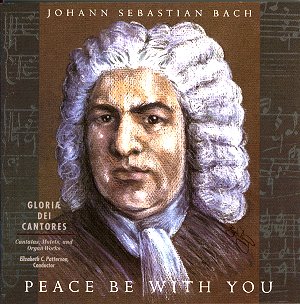Despite its threateningly saccharine title, this is
a mixed bag of demanding music by Bach to mark the 250th
anniversary of his death. There are solo organ works interspersed
amongst accompanied and a capella choral works from this
Cape Cod-based choir of forty singers ‘between 18 and 60 from
a wide variety of occupations, denominations and musical background’.
It appears to be a disciplined group, clearly well-drilled by
a deceptively grandmotherly and benign looking lady with a ready
smile and obvious enthusiasm for her task. The standard of both
playing and choral singing on this double album is mostly creditable,
but there is disappointment in the solo arias in which technically
taxing melismas are threatened with loss of control, while high
notes are too often unsettlingly strained. Marking out the lines
of Bach’s vocal music has to have a sense of direction, with points
of arrival and departure on the way, and above all avoiding any
purposeless meandering, making these shorter choral works incredibly
hard to shape. An exception, however, is the singing of the delightful
duet ‘Wir eilen’ for soprano and alto accompanied by cello and
harpsichord, in which both soloists here convey its sense of joyful
eagerness with a delectable blend of tone. The performance by
the choir of ‘Jesu, meine Freude’ is stylishly phrased and the
German diction articulated with impeccable clarity (‘Es ist nun
nichts’), if not always with accurate pronounciation (vowels such
as the ‘o’ in ‘Trotz’). True there is some worryingly errant flattening
of pitch and tight top notes have a vice-like grip on the sopranos’
throats in places. Bach could be cruelly demanding on the human
voice, treating it more like a woodwind instrument or, worse still,
like an organ stop with limitless supplies of air. In any event,
this choir, particularly the tenors and basses, takes its own
corporate name to heart and sings it all ‘to the glory of God’.
The playing, in today’s authentic style, of the string and woodwind
instrumentalists accompanying them is highly satisfying; the solos
by leader, principal flute and oboe confidently assured.
The organ of the Methuen Music Hall was originally
built for the Boston Music Hall and inaugurated in November 1863,
purportedly the first concert organ in the United States. It was
removed in 1884 to make more space for the orchestra, placed in
store, and auctioned in 1897 by which process it found its way
to its present site. It was so coveted by its new owner that,
contrary to usual practice, a hall was designed to house it rather
than the other way around. It was extensively reconstructed in
1947, with the addition of chorus reeds on the Great, and more
recently given a solid-state combination action. It has a bright
sound as treated here by its two players, their choices of registration
occasionally too monochrome. Sharon Rose Pfeiffer is not entirely
on top of the virtuosic passages in the Toccata, and takes a somewhat
stodgy tempo for the Fugue, giving it a rather perfunctory ending.
Of the three works here, the ‘St Anne’ Prelude and Fugue will
be the most familiar. Once again the registration is rather unimaginative
and the music lacks a sense of dance or energy in its forward
progress. Perhaps the resonant acoustic makes the player wait
to hear before moving on, producing a gradual slowing down in
the Prelude. The fugue at least has an appropriate sense of grandeur.
Christopher Fifield

